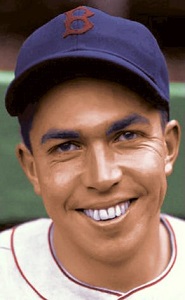 |
Melo Almada was the first Mexican-born ballplayer to play in the major leagues. He was born in Mexico but grew up in Los Angeles. There were two other Latinos, who came to the Majors before him, pitchers Frank Arellanes and Charley Hall. They were both born in the United States and all three played for the Red Sox. Though he lacked power, Melo was a good contact hitter and base-stealer. He often led off, and seemed to be running towards first base even before his bat met the ball (similar to Ichiro). His father was a passionate baseball fan and encouraged Melo and his brother, Lou to play the game. Melo pitched throughout high school and played outfield. He also played American Legion ball and for a semipro team in the area. After he graduated from high school, Melo went to be with his brother Lou, who was playing with the Seattle Indians in the Pacific Coast League in 1932. Their manager, Ernie Johnson urged Melo to quit pitching and become an outfielder. Though originally intended as a utility outfielder, he played in 127 games for Seattle, hitting .311, with six home runs and also stole 28 bases. In 1933, Melo was being touted as perhaps the “best young outfield prospect” in the Pacific Coast League and was already being predicted that he would be sold to a major league club before the season was out. Indeed, Eddie Collins signed him for the Red Sox in July. It was one of new owner Tom Yawkey’s early deals. The Sox left him with Seattle for further seasoning, but Melo made his big-league debut in September 1933, playing center field and led off in both games of a Fenway doubleheader against Detroit, going 1-for-4 in each game. Melo hit his only home run of his first season, off New York’s Herb Pennock. He had replaced Smead Jolley during a 16-12 slugfest and scored three of the Sox dozen runs and batted .341 in 14 games before the end of the season. One of the reasons he finished with such a good average was that he batted against Babe Ruth in the last game the Babe ever pitched, on October 1st. In Yankee Stadium, Babe gave up 12 hits, three of them to Melo, who drove in one run. During the offseason, Melo played in a few exhibition games in the Los Angeles area, including one against Satchel Paige and the Philadelphia Royal Giants and another with a group of all-stars against the USC Trojans. The 1934 Red Sox, entering their first full year under new owner Tom Yawkey, began to build a farm system. They exercised an option held on Melo and sent him down to the Kansas City Blues of the American Association. There, he played excellent ball, made the All-Star team, and won the club’s MVP award, thanks in good part to his .328 average and 30 stolen bases. Near the end of the year, the Sox recalled him. Melo had two of the three hits the Sox mustered against Detroit’s Elden Auker on September 10th. He also singled and scored the lone run two days later in a 1-0 win against the Tigers. In 1935, Meo went to his first spring training with the big league team and came out strong. He stuck with the Sox and impressed everyone throughout the early going. His .290 batting average included three homers and 59 RBIs, plus nine triples, and he stole 20 bases. The Sox added Heinie Manush in 1936 and he won about the same playing time as Melo and Dusty Cooke. It was a deeper outfield, but Melo’s hitting dropped off, first in spring training and then again later in the season. Manager Joe Cronin sat him down in September, with Jimmie Foxx taking over for some 16 games in the outfield. Melo hit one homer with 21 RBIs. In 1937, after coming back from a concussion, Melo was asked to fill in four days for Foxx at first and for an early stretch in the outfield, but he wasn’t being used so much. He became part of a large trade with Washington in June when both of the Ferrell brothers were traded to the Washington Senators, along with Melo. |
|||||
